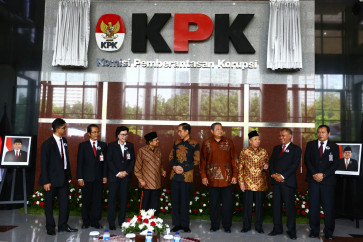Popular Reads
Top Results
Can't find what you're looking for?
View all search resultsPopular Reads
Top Results
Can't find what you're looking for?
View all search resultsKPK faces uncertain future as new law takes effect
Change text size
Gift Premium Articles
to Anyone
T
he Corruption Eradication Commission (KPK) is bracing for the possibility of major hurdles to its graft-busting operations following the enactment of the revised KPK Law and the reappointment of Yasonna Laoly as the law and human rights minister.
The revised KPK Law took effect by default on Oct. 17, 30 days after being passed by the House of Representatives, although President Joko “Jokowi” Widodo has yet to sign the bill as of Wednesday.
Law and Human Rights Ministry Legislation Director General Widodo Ekatjahjana said the government had enacted the bill into Law No. 19/2019 on KPK.
“We have handed over a copy of the law to the State Secretariat to be authenticated. After that, we will publish it publicly,” Widodo said Friday, as quoted by Antara news agency.
The President is yet to issue a government regulation in lieu of law (Perppu) to revoke the revised law, which strips the KPK of some of its law-enforcement powers.
Transparency International Indonesia secretary-general Dadang Trisasongko said the President could still change the course of the KPK’s future.
“The President still has plenty of time to issue the Perppu, and he should because the revised law contradicts its purpose of strengthening the KPK,” Dadang said.


















